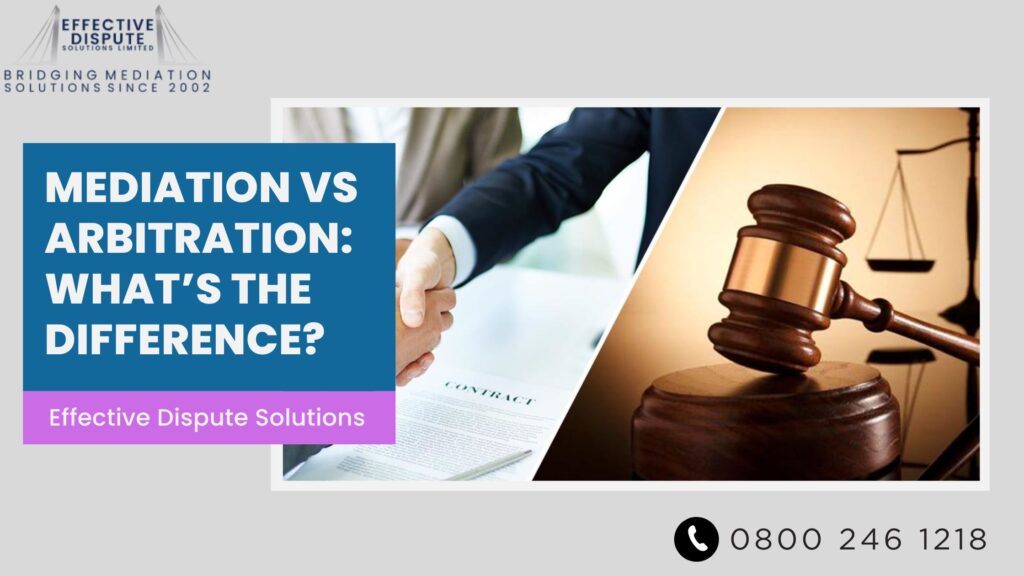
Disagreements are an inevitable part of life. Maybe you and a co-worker can’t agree on who undertakes what. Maybe you and your neighbours are arguing about the boundary line. Or maybe your business partner sees things differently and is pulling in a different direction.
When talks break down, you might wonder, “What now?” You have options. Two of the most common are mediation and arbitration. But what is arbitration vs mediations? How do they work, and which is better for you? Let’s break it down, step by step, in plain English.
What is Mediation?
Mediation is a way to solve problems with the help of a neutral third person called a mediator. This person isn’t on anyone’s side. They don’t make decisions or force anyone to agree. Instead, the mediator helps you and the other person talk things through.
You both get to share your concerns. The mediator listens, asks questions, and guides the conversation. The goal? To help you both find a solution you can live with and accept. You’re in control. If you don’t like the options, you don’t have to agree. The final decision is yours, not the mediator’s. They simply facilitate the process and get you to your end goal.
What is Arbitration?
Arbitration is different. Here, a neutral person called an arbitrator listens to all the parties and then makes a decision. Known as an award. It’s more like a private court case. The parties present their cases. Provide any relevant evidence, and answer the questions asked.
At the end of the process, the arbitrator decides who to grant an award in favour of. Their decision is final and legally binding. Unlike mediation you give up control. The arbitrator decides, not you. You have to follow the decision, even if you don’t like it.
Mediation vs Arbitration: The Basics
Let’s compare the two. Here’s a simple table to show the difference between arbitration and mediation:
| Feature | Mediation | Arbitration |
| Who decides? | You and the other party | Arbitrator |
| Process | Informal, flexible | Formal, structured |
| Outcome | Agreement if both sides say yes | Decision by arbitrator (award) |
| Binding? | Binding in civil and commercial disputes, not binding in workplace disputes | Usually binding and enforceable |
| Cost | Lower | Higher than mediation, less than court |
| Confidential? | Yes | Yes, but awards may become public |
| Speed | Fast (four to eight hours typically) | Slower than mediation, faster than court |
| Control | You have control | Arbitrator has control |
| Stress Level | Lower | Higher |
How is Arbitration Different from Mediation?
The main difference between arbitration and mediation is who makes the final decision. In mediation, you do. In arbitration, the arbitrator does. Mediation is about working together.
Arbitration is similar to the court litigation process, one party will win, the other lose.
- Mediation: You talk, you listen, you decide.
- Arbitration: You present your case, and the arbitrator decides.
How Does the Mediation Process Work?
Here are the steps you can expect in the mediation process:
- Agreement to Mediate: You and the other party agree to try mediation.
- Choosing a Mediator: You pick someone neutral, often with experience in the type of dispute you are trying to resolve.
- Opening Session: The mediator explains the rules and process.
- Position Statements: Each party presents their case, hopefully without interruption.
- Private Meetings: At some point the mediator meets with each side alone.
- Finding Solutions: The mediator helps the parties to generate options.
- Agreement: If you agree, the solution is written down. Once signed, it becomes legally binding upon the parties. Unless it is a workplace dispute.
The steps involved in mediation are simple and focused on helping you work things out together.
How Does Arbitration Work?
A typical arbitration is as follows:
- Agreement to Arbitrate: You and the other party agree to use arbitration (often in a contract).
- Choosing an Arbitrator: You pick someone neutral.
- Hearing: Each side presents their case, presents their evidence, and answers questions.
- It is important to note that an arbitrator can make an award via documents only, as well as through a hearing.
- Decision: The arbitrator reviews everything and makes a decision.
- Award: The decision is given in writing. It’s usually final and binding.
Arbitration is more formal, and you may need a solicitor. The process is structured, and the outcome is out of your hands.
Mediation vs Arbitration Pros and Cons
Let’s look at the advantages & disadvantages of both processes.
Mediation Pros
- Cheaper than arbitration or court.
- Quicker results, often in hours or one day.
- Private and confidential.
- You keep control.
- Less stress, more flexible.
- It can help save and preserve pre existing relationships.
Mediation Cons
- No guarantee of an agreement.
- It can add to the cost of litigation if an agreement is not reached.
Arbitration Pros
- Faster than court.
- Private.
- Final decision, no endless arguing.
- Suitable for complex cases.
Arbitration Cons
- More expensive than mediation.
- With less control, you must accept the arbitrator’s decision.
- It can be stressful and formal.
- Limited right to appeal if any.
Arbitration vs Mediation Cost
Cost matters. Mediation is almost always cheaper than arbitration. Why? Mediation is less formal, does not necessarily need solicitors, and usually takes less time. Therefore any solicitor fees will be much less than those racked up at an arbitration.
Arbitration can also include solicitor fees, generally a lot of documents to read through, and more or longer sessions. Both processes are cheaper than court, but mediation is the more budget-friendly choice.
Example:
A workplace dispute between two employees over communication can be addressed and resolved within eight hours. The average cost for workplace mediation is between £500 – £3000. Whereas an arbitration could cost anywhere between £5000 – £50,000.
Mediation vs Arbitration: Which is Better?
So, mediation or arbitration, which process is better? It depends upon your individual case and circumstances.
- Choose Mediation if:
- You want to keep control.
- You care about your relationship with the other person.
- You want to save money and time.
- You want a private, low-stress process.
- Choose Arbitration if:
- You need a final answer.
- The other side won’t budge.
- You want someone else to decide.
- The case is complex and needs expert judgment.
Why Mediation is Better Than Arbitration (Most of the Time)
Here’s why mediation often comes out on top:
- You’re in charge: You decide, not a stranger.
- Saves relationships: Mediation is about working together, not fighting.
- Less stress: No formal hearings, no cross-examination.
- Quick and private: Most disputes are settled fast and stay private.
- Flexible: You can get creative with solutions.The possibilities are endless.
But remember, if you need a final, binding judgement, or if the other side won’t communicate, arbitration might be your best bet.
Tips for Choosing
- Think about your relationship. Do you want to keep working together?
- How much control do you want over the outcome?
- How quickly do you need a solution?
- What’s your budget?
- Do you want the process to be private?
If you’re not sure, talk to a professional. At Effective Dispute Solutions, we help people every day choose the right path for their disputes. Our mediation services are fast, affordable, and private. We also offer expert mediator services for those who want to try mediation first.
A number of our mediators are also arbitrators, so should you require arbitration, we can also provide you with that.
Mediation vs Arbitration, Make the Right Choice for You
Both mediation and arbitration are better than fighting it out in court. The main difference? Mediation lets you stay in control and work together. Arbitration is similar to a court hearing, just quicker, cheaper and more informal.
So, what is arbitration vs mediation? Mediation is about talking and finding a solution together. Arbitration is about letting someone else decide. The difference between arbitration and mediation is all about control, cost, and your goals.
If you want to save time, money, and stress, and keep relationships strong, mediation is usually the best first step.
Need help? Contact Effective Dispute Solutions for advice and support. We’re here to help you find the best way forward, quickly, affordably, and with less stress.
To learn more about our mediation services and or arbitration procedures, book a free consultation, visit our website or call us today. Let’s start your journey together to end your dispute once and for all.

